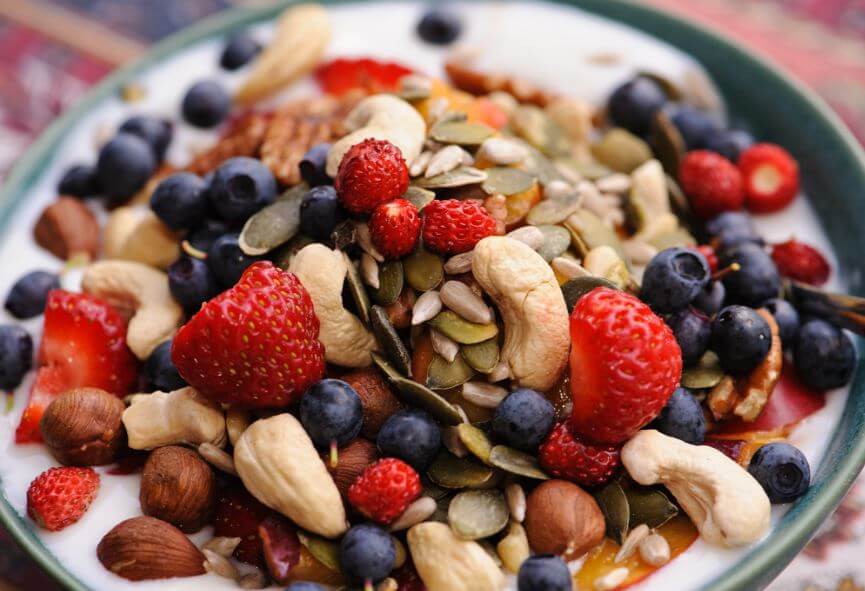How to Build Muscle on a Vegetarian Diet

Many people think that everyone who follows a vegetarian diet is thin. Nothing is further from the truth! Another misconception is that those who don’t eat meat can’t build muscle. In this article, we’ll share why that isn’t true.
Can I build muscle on a vegetarian diet?
A vegetarian diet is one that doesn’t include meat. As we previously stated, it’s commonly believed that it’s not possible for vegetarians to build muscle despite training.
However, there are many examples of vegetarians (and even vegans) who’ve been able to increase muscle mass without changing their diets. On the surface, it seems a difficult mission to accomplish, however, it’s possible.
The truth is however, there are many foods that aren’t derived from animals that have large amounts of nutrients. This includes protein which is needed to gain muscle mass.
If you follow a vegetarian diet and want to gain muscle, the first thing you should do is consult a specialist. A nutritionist will be able to help you prepare a plan which you’ll need to achieve your goals.
The three pillars to gaining muscle
These pillars have to do with the essentials that everyone needs in order to be healthy. The only thing that changes is the source of these essential nutrients.
Proteins
You must keep in mind that in order to gain the right amount of protein that the body needs to build muscle, you’ll need to ingest healthy portions of vegetables, whole grains, and nuts. Portions have to be larger since there are no plant foods that have as much protein content as meat.

According to rules for protein consumption; in order to build muscle, you should consume at least two grams of this nutrient for every 2 pounds of weight. If you weigh 150 pounds you’ll need to eat at least 140 grams of protein. That’s a lot of nuts and almonds!
A good way to increase your protein intake is to take advantage of the nutrients that dairy products contain. You’ll be able to receive this important nutrient by consuming milk, cottage cheese, yogurt, and butter. Don’t forget to add eggs to your diet, you can even include them in your shakes.
Soy protein is also a good replacement for meat protein. You can consume soy in many different ways: beans, milk, tofu, miso, tempeh, etc.
Fats
The good thing about having a vegetarian diet is that the fats that you consume are healthy. You can find fat in olive oil, olives, nuts, seeds, and avocados. Following the previous example, in order to increase muscle mass, a person who weighs 150 pounds should ingest 150 grams of fat daily to obtain their goals.
Avoid ingesting fats from processed sources such as pastries, salty snacks, and fried foods.
Carbohydrates
Carbohydrates are essential for gaining muscle. However, this doesn’t mean that you should spend your whole day eating pasta. Try wholemeal flour, oatmeal, brown rice, potatoes, and seeds in order to increase your muscle mass.
Sample menu to build muscle while on a vegetarian diet
Here are a few examples of meals that a vegetarian can include in their diet:
- Protein shakes with soy milk and bananas.
- Almond butter sandwiches with two slices of whole wheat bread and grapefruit.
- A baked potato, 1/4 avocado and a can of beans.

- Steamed broccoli with spinach and half a cup of lentils or brown rice.
- Two slices of whole wheat bread with seeds and avocado.
- Quinoa and lentil burger with tomatoes a potato salad and eggs.
- Creamy mushroom soup with soy milk.
If you follow a vegetarian diet, you’ll have to receive your protein from other sources. This will help you achieve your goal of healthy muscle gain.
If that doesn’t work for you and you don’t eat meat, you can try vegetarian smoothies, with large doses of proteins and carbohydrates. Consult your trainer and nutritionist and find what works best for you!
Many people think that everyone who follows a vegetarian diet is thin. Nothing is further from the truth! Another misconception is that those who don’t eat meat can’t build muscle. In this article, we’ll share why that isn’t true.
Can I build muscle on a vegetarian diet?
A vegetarian diet is one that doesn’t include meat. As we previously stated, it’s commonly believed that it’s not possible for vegetarians to build muscle despite training.
However, there are many examples of vegetarians (and even vegans) who’ve been able to increase muscle mass without changing their diets. On the surface, it seems a difficult mission to accomplish, however, it’s possible.
The truth is however, there are many foods that aren’t derived from animals that have large amounts of nutrients. This includes protein which is needed to gain muscle mass.
If you follow a vegetarian diet and want to gain muscle, the first thing you should do is consult a specialist. A nutritionist will be able to help you prepare a plan which you’ll need to achieve your goals.
The three pillars to gaining muscle
These pillars have to do with the essentials that everyone needs in order to be healthy. The only thing that changes is the source of these essential nutrients.
Proteins
You must keep in mind that in order to gain the right amount of protein that the body needs to build muscle, you’ll need to ingest healthy portions of vegetables, whole grains, and nuts. Portions have to be larger since there are no plant foods that have as much protein content as meat.

According to rules for protein consumption; in order to build muscle, you should consume at least two grams of this nutrient for every 2 pounds of weight. If you weigh 150 pounds you’ll need to eat at least 140 grams of protein. That’s a lot of nuts and almonds!
A good way to increase your protein intake is to take advantage of the nutrients that dairy products contain. You’ll be able to receive this important nutrient by consuming milk, cottage cheese, yogurt, and butter. Don’t forget to add eggs to your diet, you can even include them in your shakes.
Soy protein is also a good replacement for meat protein. You can consume soy in many different ways: beans, milk, tofu, miso, tempeh, etc.
Fats
The good thing about having a vegetarian diet is that the fats that you consume are healthy. You can find fat in olive oil, olives, nuts, seeds, and avocados. Following the previous example, in order to increase muscle mass, a person who weighs 150 pounds should ingest 150 grams of fat daily to obtain their goals.
Avoid ingesting fats from processed sources such as pastries, salty snacks, and fried foods.
Carbohydrates
Carbohydrates are essential for gaining muscle. However, this doesn’t mean that you should spend your whole day eating pasta. Try wholemeal flour, oatmeal, brown rice, potatoes, and seeds in order to increase your muscle mass.
Sample menu to build muscle while on a vegetarian diet
Here are a few examples of meals that a vegetarian can include in their diet:
- Protein shakes with soy milk and bananas.
- Almond butter sandwiches with two slices of whole wheat bread and grapefruit.
- A baked potato, 1/4 avocado and a can of beans.

- Steamed broccoli with spinach and half a cup of lentils or brown rice.
- Two slices of whole wheat bread with seeds and avocado.
- Quinoa and lentil burger with tomatoes a potato salad and eggs.
- Creamy mushroom soup with soy milk.
If you follow a vegetarian diet, you’ll have to receive your protein from other sources. This will help you achieve your goal of healthy muscle gain.
If that doesn’t work for you and you don’t eat meat, you can try vegetarian smoothies, with large doses of proteins and carbohydrates. Consult your trainer and nutritionist and find what works best for you!
All cited sources were thoroughly reviewed by our team to ensure their quality, reliability, currency, and validity. The bibliography of this article was considered reliable and of academic or scientific accuracy.
- Pérez, A. C. (1975). Las proteínas y la dieta vegetariana. World Review.
This text is provided for informational purposes only and does not replace consultation with a professional. If in doubt, consult your specialist.








